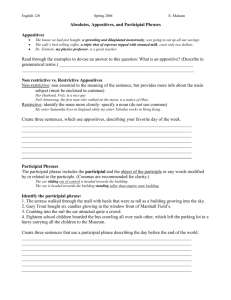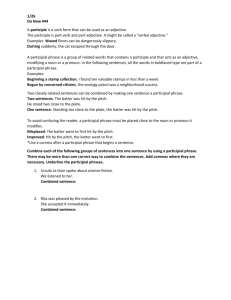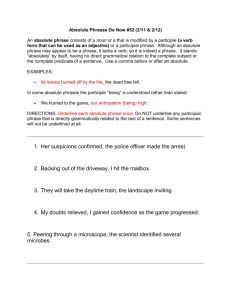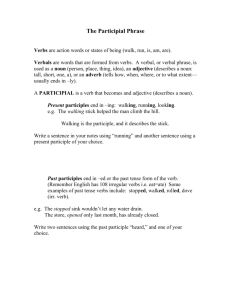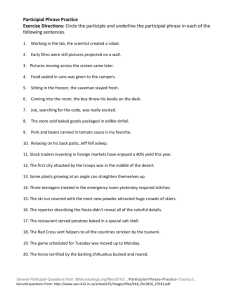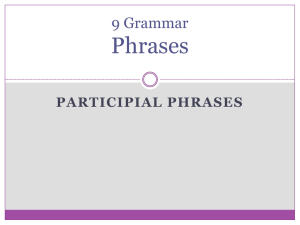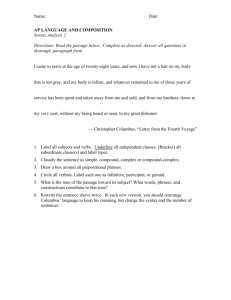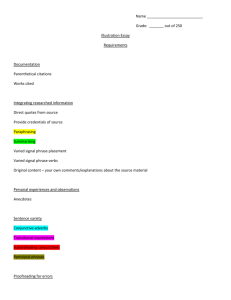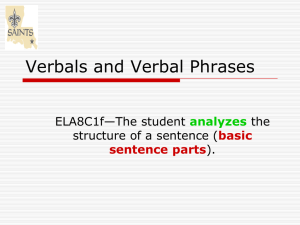Sentence variety exercise 4
advertisement
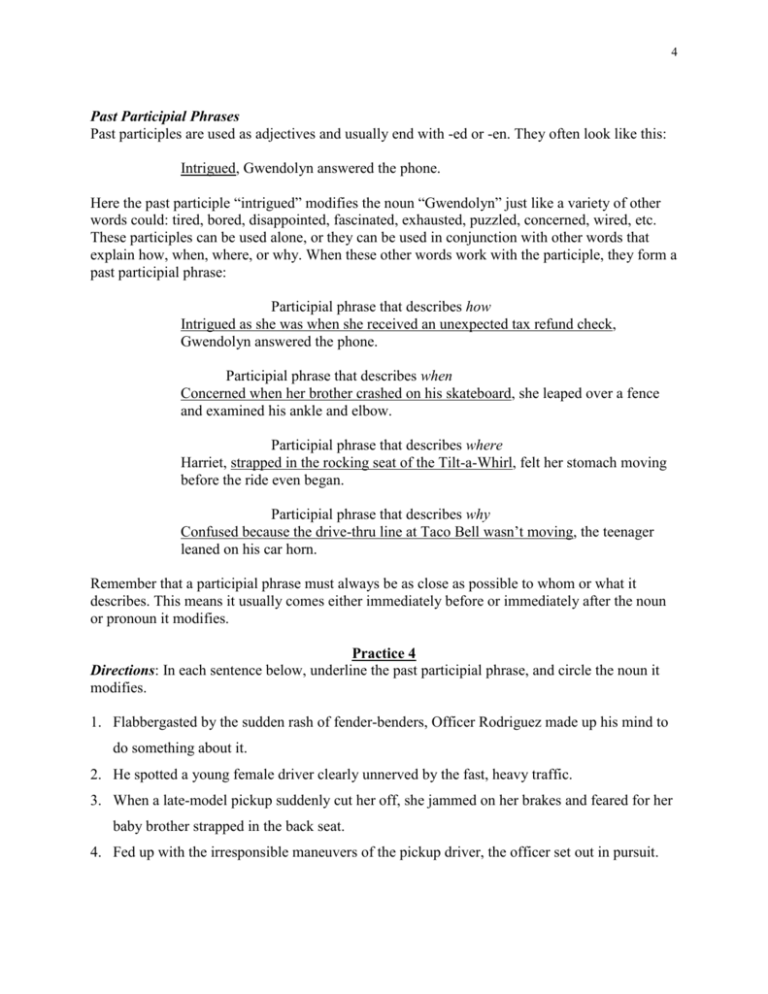
4 Past Participial Phrases Past participles are used as adjectives and usually end with -ed or -en. They often look like this: Intrigued, Gwendolyn answered the phone. Here the past participle “intrigued” modifies the noun “Gwendolyn” just like a variety of other words could: tired, bored, disappointed, fascinated, exhausted, puzzled, concerned, wired, etc. These participles can be used alone, or they can be used in conjunction with other words that explain how, when, where, or why. When these other words work with the participle, they form a past participial phrase: Participial phrase that describes how Intrigued as she was when she received an unexpected tax refund check, Gwendolyn answered the phone. Participial phrase that describes when Concerned when her brother crashed on his skateboard, she leaped over a fence and examined his ankle and elbow. Participial phrase that describes where Harriet, strapped in the rocking seat of the Tilt-a-Whirl, felt her stomach moving before the ride even began. Participial phrase that describes why Confused because the drive-thru line at Taco Bell wasn’t moving, the teenager leaned on his car horn. Remember that a participial phrase must always be as close as possible to whom or what it describes. This means it usually comes either immediately before or immediately after the noun or pronoun it modifies. Practice 4 Directions: In each sentence below, underline the past participial phrase, and circle the noun it modifies. 1. Flabbergasted by the sudden rash of fender-benders, Officer Rodriguez made up his mind to do something about it. 2. He spotted a young female driver clearly unnerved by the fast, heavy traffic. 3. When a late-model pickup suddenly cut her off, she jammed on her brakes and feared for her baby brother strapped in the back seat. 4. Fed up with the irresponsible maneuvers of the pickup driver, the officer set out in pursuit. 5 5. He was determined to make an example of this driver, and it didn’t occur to him until after he had turned on his flashing lights that he should have recognized the truck, painted a brilliant yellow, and his influential father-in-law behind the wheel. Notice in the above sentences that participial phrases can appear anywhere in a sentence—in the beginning as in #1, at the end as in #2, or in the middle as in #5. Regardless of the location of the phrase, however, rules concerning punctuation with participial phrases always stay the same. Punctuating participial phrases When punctuating past participial phrases, you need to remember two basic rules: 1. always place a comma after an introductory participial phrase (one that precedes an independent clause) Introductory present participial phrase Fascinated by history and by the unusual stone objects she found near the river, she decided to study anthropology in college. 2. for participial phrases that aren’t introductory, place commas around non-restrictive phrases—those that provide supplementary information rather than information essential to the meaning of the sentence. (Participial phrases are usually non restrictive when they modify a proper noun—one that’s capitalized.) Here’s an example: Non-restrictive present participial phrase The Jefferson Street Jewelry Story, guarded by armed security officers, was robbed on Friday. Without the participial phrase—“guarded by armed security officers”—the reader still knows which store was robbed on Friday: The Jefferson Street Jewelry Story. Since the store’s name is right there (and notice that it’s a proper noun), the participial phrase provides information that is supplementary, not essential. However, restrictive participial phrases—those that contain information essential to the meaning of the sentence—are not set off with commas. (Participial phrases are usually restrictive when they modify a common noun—one that’s not capitalized.) Here’s another example: Restrictive present participial phrase The store guarded by armed security officers was robbed on Friday. Because the participial phrase “guarded by armed security officers” identifies (or restricts) which specific store was robbed on Friday, no commas set off the participial phrase from the rest of the sentence. Notice that “store” is a common noun. Practice 5 Directions: In the following sentences, underline all past participial phrases and correct any errors in punctuation: 6 1. The grass planted two weeks ago is starting to turn brown. 2. Jersey Helgeson shocked by the sudden success of his one-act play vowed to give the proceeds from the first-week’s run to charity. 3. Overwhelmed by demands for tickets, the theater added two more shows in addition to the three, already scheduled. 4. The janitor Hugo startled by the superintendent dropped the fluorescent bulb from his perch on top of the stepladder. 5. Disqualified, for biting his opponent’s ear Mike Tyson later apologized at a press conference. Practice 6 Directions: Create the following sentences as instructed. 1. Use the word “irritated” in a past participial phrase in a sentence. 2. Add a past participial phrase to this sentence: “The dentist drilled the patient’s cavity without first giving him Novocaine.” 3. Add this past participial phrase to a sentence: “thrilled that the art exhibit was coming to her small town.” 4. Use the appropriate form of the word “abandon” in a past participial phrase, and attach the phrase to an independent clause. 5. Write a sentence that contains a past participial phrase that should not be set off with commas.
